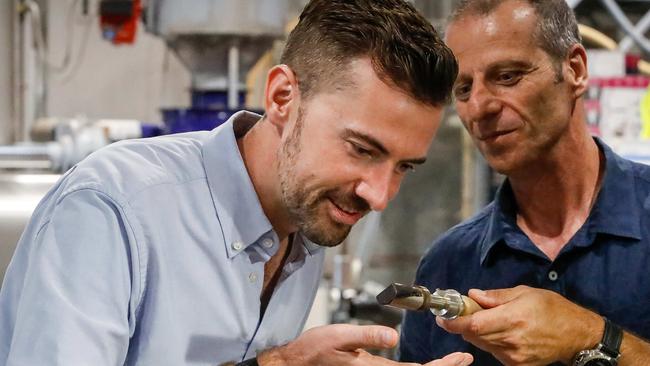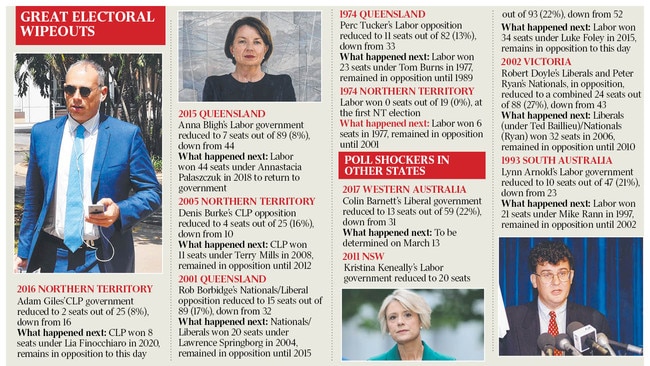How the west can be lost and then won
It generally takes a decade or more for a party to recover from an election defeat of the magnitude facing the Liberals in WA.

For any West Australian Liberal supporters feeling disconsolate about the party’s looming wipe-out at next weekend’s state election, we have some good news and some bad news.
The good news is that WA generally does not give governments three terms in power. That would put the Liberals in the box seat to reclaim government in 2025.
The bad news, however, is that it normally takes a decade or more for a party to recover from an election defeat of the magnitude facing the Liberal Party in WA — in which case the party may not have a sniff of governing again for a long time to come.
A Newspoll two weeks ago found Premier Mark McGowan’s Labor government had increased its lead over the Liberals to 68 to 32 on a two-party preferred basis, a level never before seen in Newspoll history.
A swing of that magnitude would reduce the Liberals to as few as two seats in WA’s lower house, an almost unthinkable outcome in a state that remains a Liberal stronghold federally.
While WA Liberal leader Zak Kirkup questioned the merits of the poll, he conceded just days later that the party would not win the election. Since then, he has been campaigning — with some effectiveness — on a warning not to give Labor “total control” of both houses of government.
While the main unknown about next Saturday’s election is how much of the furniture the Liberals can save, the history books show that it is usually a long road back for parties that suffer landslide defeats.
The one notable exception was the Labor Party’s famous resurrection in Queensland in 2015. Anna Bligh’s Labor government was reduced from 44 of 89 seats to just seven in 2012. Just three years later, however, Annastacia Palaszczuk led Labor back into government with her remarkable defeat of Campbell Newman.

Ben Reilly, a professor of political science at the UWA School of Social Sciences, noted that Ms Palaszczuk’s swift recovery owed as much to the deep unpopularity of the incumbent government of the time as anything else.
While Mr McGowan will not unleash any of the big public service cuts that occurred under Mr Newman, Professor Reilly said the Premier needed to be careful not to be seen as hubristic.
“(Labor in Queensland) got rid of their leader and they changed their policies, but Campbell Newman became seen as very arrogant and almost dictatorial,” Professor Reilly said.
“That is something McGowan has to be careful of. There’s been a few things recently — not least his silly statements on the border — that I think make people a little bit uncomfortable.”
Mr McGowan sparked an outcry this week when he said he was in discussions with the state’s police commissioner over whether aspects of the state’s border controls — including the visa-like G2G entry system — could become a permanent feature beyond the pandemic.
He retracted the stance just hours later after a backlash, but Mr Kirkup has seized on the incident as an example of why Labor should not be trusted with outright control of both houses of parliament.
John Phillimore, the executive director of The John Curtin Institute of Public Policy at Perth’s Curtin University, said there were no parallels in WA for the wipe-out facing the Liberals. But he noted the state had a long recent history of not giving governments a third term. “In the modern era, Western Australia has been a model of consistency in two-term governments,” he said.
The prospects of that history repeating again will rely on the Liberals retaining enough talent next weekend to make a serious case for change in 2025.
“If the Liberals have only half a dozen MPs, it’s going to be much tougher for them to come back win,” Professor Phillimore said.




To join the conversation, please log in. Don't have an account? Register
Join the conversation, you are commenting as Logout